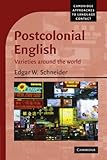Postcolonial English: varieties around the world
Material type: TextPublication details: New Delhi Cambridge University Press 2007Description: xvi, 367pISBN: 0-521-53901-3Subject(s): Post colonial English | LiteratureDDC classification: 801.95 Summary: The global spread of English has resulted in the emergence of a diverse range of postcolonial varieties around the world. Postcolonial English provides a clear and original account of the evolution of these varieties, exploring the historical, social and ecological factors that have shaped all levels of their structure. It argues that while these Englishes have developed new and unique properties which differ greatly from one location to another, their spread and diversification can in fact be explained by a single underlying process, which builds upon the constant relationships and communication needs of the colonizers, the colonized, and other parties. Outlining the stages and characteristics of this process, it applies them in detail to English in sixteen different countries across all continents as well as, in a separate chapter, to a history of American English. Of key interest to sociolinguists, dialectologists, historical linguists and syntacticians alike, this book provides a fascinating new picture of the growth and evolution of English around the globe.
TextPublication details: New Delhi Cambridge University Press 2007Description: xvi, 367pISBN: 0-521-53901-3Subject(s): Post colonial English | LiteratureDDC classification: 801.95 Summary: The global spread of English has resulted in the emergence of a diverse range of postcolonial varieties around the world. Postcolonial English provides a clear and original account of the evolution of these varieties, exploring the historical, social and ecological factors that have shaped all levels of their structure. It argues that while these Englishes have developed new and unique properties which differ greatly from one location to another, their spread and diversification can in fact be explained by a single underlying process, which builds upon the constant relationships and communication needs of the colonizers, the colonized, and other parties. Outlining the stages and characteristics of this process, it applies them in detail to English in sixteen different countries across all continents as well as, in a separate chapter, to a history of American English. Of key interest to sociolinguists, dialectologists, historical linguists and syntacticians alike, this book provides a fascinating new picture of the growth and evolution of English around the globe.
| Item type | Current library | Call number | Status | Date due | Barcode |
|---|---|---|---|---|---|
 BK
BK
|
Stack | 801.95 SCH/P (Browse shelf (Opens below)) | Available | 21491 |
Browsing Kannur University Central Library shelves, Shelving location: Stack Close shelf browser (Hides shelf browser)
Includes index.
The global spread of English has resulted in the emergence of a diverse range of postcolonial varieties around the world. Postcolonial English provides a clear and original account of the evolution of these varieties, exploring the historical, social and ecological factors that have shaped all levels of their structure. It argues that while these Englishes have developed new and unique properties which differ greatly from one location to another, their spread and diversification can in fact be explained by a single underlying process, which builds upon the constant relationships and communication needs of the colonizers, the colonized, and other parties. Outlining the stages and characteristics of this process, it applies them in detail to English in sixteen different countries across all continents as well as, in a separate chapter, to a history of American English. Of key interest to sociolinguists, dialectologists, historical linguists and syntacticians alike, this book provides a fascinating new picture of the growth and evolution of English around the globe.








There are no comments on this title.